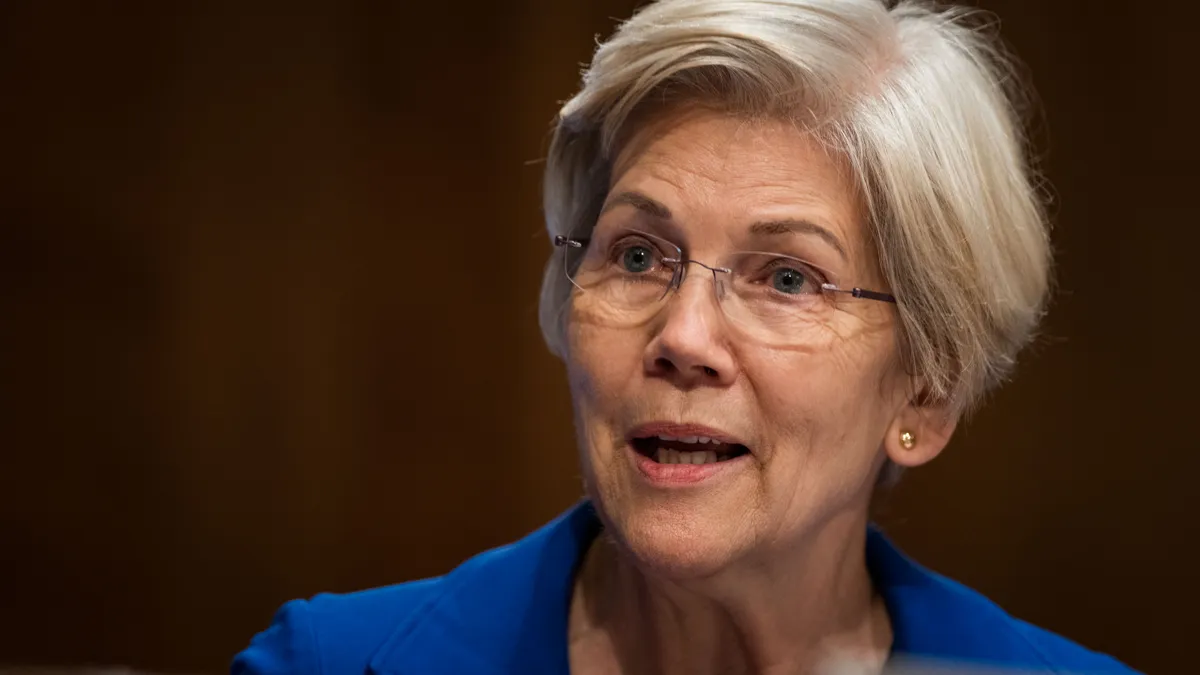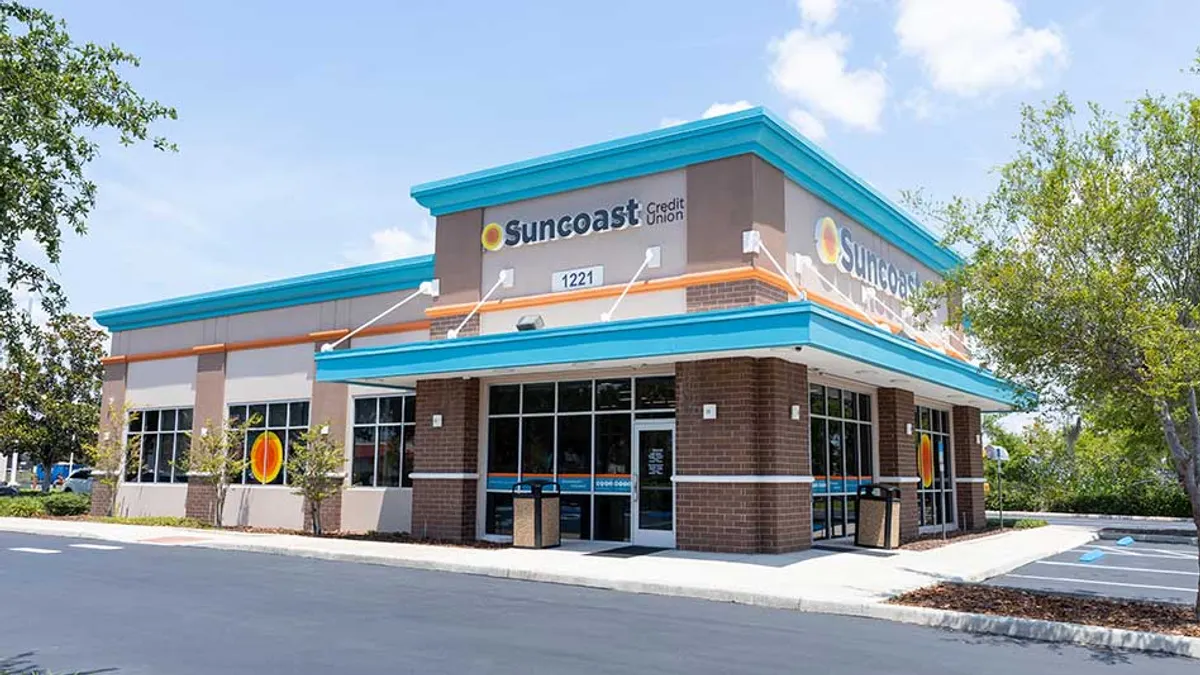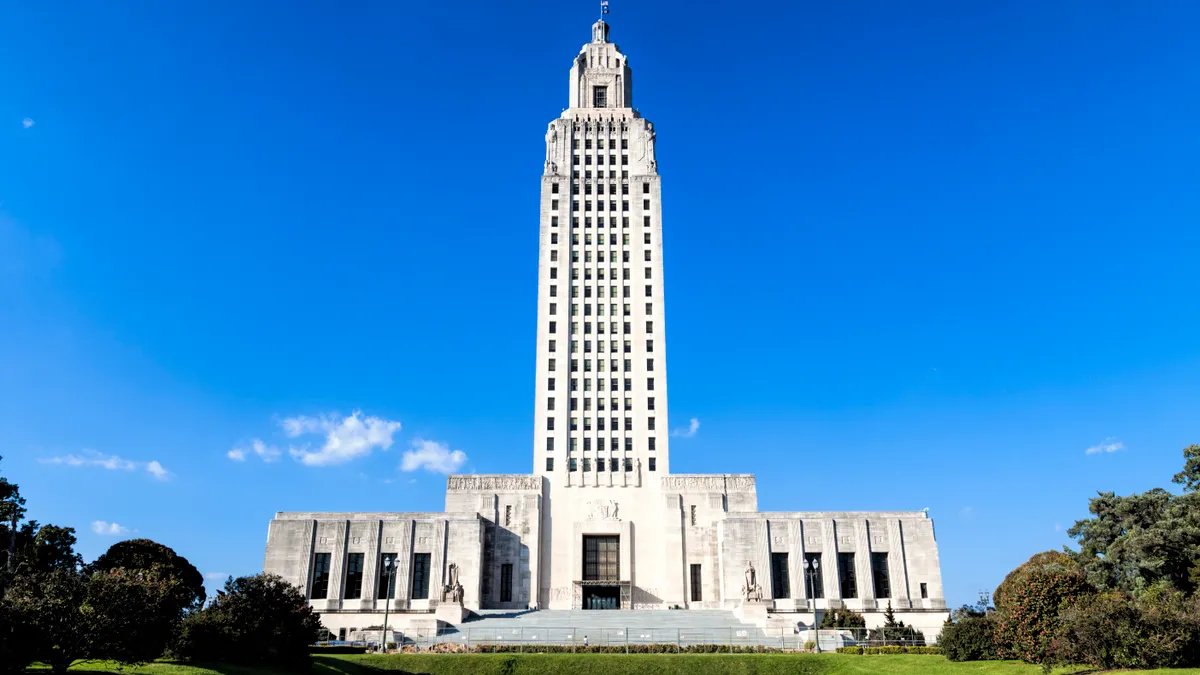When $635 million-asset Crane Credit Union announced in August it had entered into a deal to buy Spencer, Indiana-based Our Community Bank, the news added to a growing point of contention between community bankers and their not-for-profit counterparts, credit unions.
The trend of credit unions scooping up community banks has been somewhat of a thorn in the side of some community bankers and trade groups, including the Independent Community Bankers of America (ICBA), which say the purchasing power of the nonprofit institutions demonstrates they have strayed from their mandate to serve modest-income households.
Crane's purchase of $74 million-asset Our Community Bank for $13 million in cash was its second such move in as many months. The credit union in June announced plans to buy $89 million-asset Community State Bank of Southwestern Indiana for an undisclosed sum.
The planned acquisition of Our Community Bank marks the sixth credit union-bank tie-up of 2020 and the third in Indiana alone.

It's a trend that has drawn concern from Indiana Bankers Association Chairman Lucas White.
"I think if credit unions want to buy banks, they ought to be banks," said White, who also serves as the president of The Fountain Trust Company, a community bank based in Covington, Indiana.
"Indiana is hit particularly hard by this. We've had eight announcements of acquisitions in the last year. Not all of those have closed yet, but five of them have been credit unions buying banks. Just in the last year, credit unions buying banks have outnumbered banks buying banks," White said.
Why it's happening
The ICBA says the trend highlights an unfair playing field that lets tax-exempt credit unions offer higher prices to banks that have shareholders to whom they must answer.
That's the scenario in which Our Community Bank found itself when it was first approached by Crane Credit Union.
The bank hadn't marketed itself as for sale, President and CEO Kurt Rosenberger said, but the board had discussed the possibility of a strategic acquisition.
"Given the dynamics of the industry and our size, we knew we needed to consider a combination or some sort of change in our future," he said.
Rosenberger listed a host of reasons the bank needed to sell: increasing competition from nonbank lenders, the high cost of keeping up with changes in technology, the growing need for “unaffordable specialized talent" and the "suffocating regulatory pressures" restraining the bank's staff and its capacity.
"While we're keeping up with the regulations, and we are in good shape with the regulators, it was eroding earnings — paying for the expertise and keeping up to date with these things," he said. "Spending money on non-income-producing activities with a very small staff just made it very difficult."
Maintaining a full-service, locally focused financial institution became increasingly difficult, Rosenberger said, and with the low-interest-rate environment, the bank didn't see those factors changing for several years.
And shareholders were having trouble selling their shares, Rosenberger said.
"We have a fiduciary duty to our shareholders to look out for the best interest and enhance their investment," he said.
A returning trend?
The ICBA has been one of the most vocal critics of bank acquisitions by credit unions.
Last year, the group launched a campaign called "Wake Up,” featuring legislative and regulatory proposals and grass-roots advocacy campaigns to help community banks call for policy makers to review credit union practices.
The group has not minced words when expressing opposition to what it considers "risky practices, costly tax subsidies, and irresponsibly lax oversight" of credit unions.
"It's basically an obscene use of a subsidy by the credit unions," Paul Merski, the ICBA's group executive vice president for congressional relations and strategy, said of credit unions purchasing banks. "Taxpayers subsidize the credit union industry over $2 billion a year and have been doing that for decades. The proposition that a credit union can grow, tax exempt, and use that tax-exempt benefit to then turn around and displace a taxpaying entity, taking that taxpaying bank out of the market and converting it to a non-tax-generating entity, is kind of a perverse use of the credit unions' tax exemption."
Ryan Donovan, chief advocacy officer for the Credit Union National Association, said the ICBA's opposition to credit union-bank tie-ups is a membership play.
"I think that the ICBA is aggressive in their pushback of these deals because, when a bank sells to a credit union, they potentially could be losing a member of the association," Donovan said. "If you talk to bankers, they'll tell you that they want all options available because they have a responsibility to their shareholders to evaluate all options. You're going to get a different story from the bank and trade associations because their interests are different."
Credit unions have maintained their tax-exempt status since the passage of the Federal Credit Union Act in 1934.
The not-for-profit institutions, according to the law, were created for the purpose of "promoting thrift among its members and creating a source of credit for provident or productive purposes."
"Credit unions now serve one-third of the American public," Rodney Hood, chairman of the National Credit Union Association, which regulates the not-for-profit institutions, told lawmakers in December at a House Financial Services Committee hearing examining the oversight of financial regulators.
Total credit union memberships reached 124.6 million in July, according to a September trends report from CUNA Mutual Group.
Hood’s comments at the end of 2019 capped off a year that saw a record 16 announcements of credit unions’ intentions to buy banks, shattering the previous high of nine in 2018.
The uptick drew the attention of some lawmakers, including Rep. Blaine Luetkemeyer, R-Mo., who said he’s "fearful of a war beginning to break out" between credit unions and community banks.
Hood defended the trend, telling the committee there had been 32 credit unions that have acquired bank assets in the previous seven years, compared with "roughly 250 bank-on-bank acquisitions just over the past year alone."
He said, in some cases, if a credit union hadn't decided to buy a community bank, some areas would be without banking access, leaving them "vulnerable to pernicious payday lenders."
Is Congress watching?
The coronavirus pandemic has slowed the pace of credit union-bank deals. However, Michael Bell, co-leader of the financial institutions practice group at Honigman, told Banking Dive in May tie-up talks may be temporarily on hold.
"Depending on when [the outbreak] ends, I expect all of those things that are paused to heat right up," he said. "So either the end of this year will be really busy or 2021 will be busier than it was going to be.”
Florida-based Suncoast Credit Union's planned acquisition of Miami's Apollo Bank, which would have been the largest bank acquisition by a credit union since 2012, fell through in May, with Suncoast CEO Kevin Johnson citing issues related to COVID-19 as the reason for the deal’s termination.
"The COVID-19 virus changed the value of our agreement and left us with an unpredictable future," he said, adding the two entities could revisit the merger once the pandemic is over.
But the recent uptick in Indiana has some questioning whether or not lawmakers will resume their interest in the deals.
"My hope is that the acquisition of the banks is the final straw where Congress realizes, 'Enough is enough, they've gone too far, something needs to happen,'" White said.
Merski said he thinks a congressional examination of the tax-exempt status of credit unions and their growing interest in purchasing community banks is long overdue.
"There needs to be a hearing on the credit union tax exemption and purchase of taxpaying banks," he said. "There hasn't been a hearing of that nature in over 15 years."
Donovan, however, said he thinks the pandemic has turned lawmakers’ focus elsewhere.
"It's not something that we think is a high priority for them right now, and I haven't seen any evidence that suggests that it is," he said.
"Trade associations have argued against the non-taxable status of credit unions for years, but I haven't seen any changes or progress on that," Rosenberger said. "And I don't know which direction the industry is going to go with that, but it’s obviously not a priority for the powers that be."
Same competition
Credit unions seek mergers for the same reasons other financial institutions look to grow: increased competition.
Despite the clashes between credit unions and community banks, both say they face increasing competition from larger institutions with bigger technology budgets and from a growing number of nimble fintechs.
"The big banks don't care, or at least don't care as much as banks our size, because they're not looking at these small community banks to buy anymore. They're looking at much bigger deals," White said.
Credit unions provide an additional buyer pool for small banks overlooked by larger financial institutions, Kirk Hovde, managing director and head of investment banking at Hovde Group, told S&P Global.
Smaller banks may not be as attractive to larger banks given the industry’s consolidation, he said.
"The larger, serial bank acquirers are starting to get too big [so] that a $100 [million], $200 million bank that's for sale doesn't move the needle that much," Hovde said.
Credit unions don't have shareholders to answer to, and are often able to pay higher prices on these types of deals, he added.
"A credit union's cash is equal to a bank's cash," he said. “For those banks that are wanting liquidity and just [want] to cash out now, it's becoming a viable option."
Rosenberger said there’s "no doubt" the trend will continue, adding community banks have been consolidating for the last two decades.
"More recently, the credit unions have been involved in it, and part of that is because there's not as many small banks left," he said.
But for community bankers like White, the trend further highlights what he says is an unfair advantage that credit unions are granted.
"When you have a community bank that's interested in growing through an acquisition — that has to compete with a credit union to make a competitive enough offer — the fact that they don't pay taxes makes it virtually impossible for us to compete for that bank and pay anywhere close to the same price. It’s frustrating," White said.
But considering the current state of the industry, Rosenberger said, a sale to Crane Credit Union was the community bank’s best option.
"I think the trade associations have a responsibility to look out for all the members, whether they're small banks or big banks or otherwise," he said. "And while I understand their arguments, individual banks have to make their decisions on what is best for their stakeholders, shareholders, or community members and employees."
The changing dynamics of the industry won’t affect just small institutions like Our Community Bank, Rosenberger said.
"Changes are coming. The fintechs are going to have a dramatic impact on the industry going forward, and people are underestimating that right now," he said. "It won't be small community banks, it's going to be midsize banks that will be merging."




















